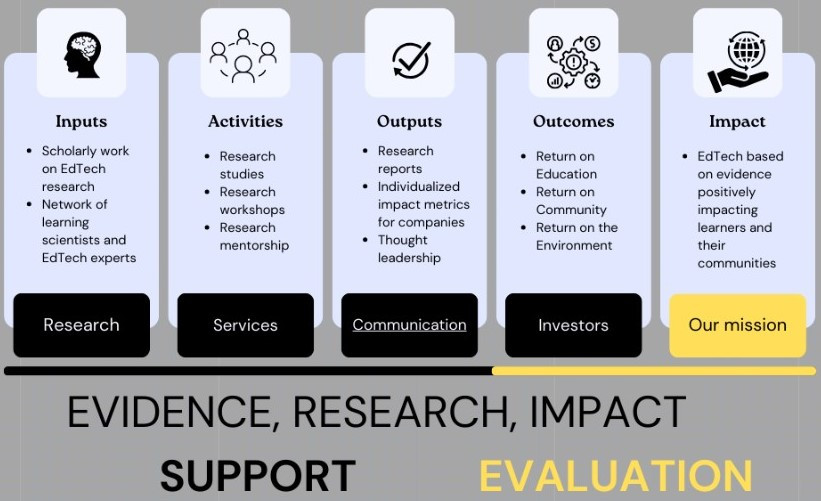WiKIT is a social enterprise that was spun off from the University of Stavanger, and was created with the goal to bridge academia and industry in the educational technology (EdTech) field by integrating scientific research into the development and implementation of digital learning tools for children.
Co-founded by Professor Natalia I. Kucirkova and supported by Validé (the innovation company of UiS), WiKIT addresses the critical need for commercial EdTech tools to be based on research and evidence to adequately support children’s educational growth. Amid the rapid expansion of EdTech globally, a gap exists in verifying these tools' true impact on learning outcomes. WiKIT bridges this gap by connecting academic researchers and EdTech developers, providing independent research services, certification guidance, and consulting for educators, developers, and policymakers regarding the quality and selection of EdTech tools. Leveraging a robust network of international research partnerships, WiKIT ensures EdTech tools align with rigorous research standards, advancing meaningful, data-driven educational practices globally. Its collaborations include multimillion companies and industry-leading EdTech investors, as well as global agencies. Throughout its operations, WiKIT promotes rigorous, inclusive research in EdTech to foster equitable, effective educational opportunities for all children.
Underpinning research
The research foundation of WiKIT stems from over fifteen years of research conducted by Professor Natalia I. Kucirkova and her colleagues, exploring how digital learning resources can support children's learning and wellbeing. This research started during Kucirkova’s PhD studies, which focused on the development and implementation research of the Our Story app for family story-making.
Further research by Kucirkova focused on identifying design features of children’s EdTech tools that are implicated in positive literacy development and co-designing digital applications for children based on the Science of Learning and socio-cultural theories. This research was motivated by the recurring finding that while carefully designed EdTech could positively impact children’s literacy and engagement, many commercial products lacked substantial evidence of educational benefits [1].
Kucirkova’s work emphasized the importance of designing EdTech tools rooted in scientific evidence rather than technology trends. The insights derived from observational and experimental studies, including meta-analyses, established that EdTech’s impact hinges on rigorous design and evaluation. This means that while digital books developed by researchers showed positive impacts on children’s comprehension, commercially available tools often yielded minimal or negative outcomes, underscoring the need for scientifically informed EdTech design processes [2].

The research services provided by WiKIT combines research methodologies including foundational (literature reviews or desktop research), formative (e.g. observational or correlational studies) and summative (e.g. experiments such as randomized controlled trials and replication) approaches. The iRPD (integrated Research-Practice-Design) developed by Kucirkova advocates for a collaboration between researchers, designers and teachers, ensuring mutual knowledge-sharing in an effective and ethical manner [3]. Through partnerships with entities like GSoLEN, an international network of learning scientists, WiKIT expanded its already large network of leading academics in the areas of children’s education. Other key partnerships, like that with Digital Promise, further show how a collaborative, multidisciplinary approach can meet the vision of science-based EdTech capable of promoting equitable, high-quality education for children worldwide.
In her recent work, Kucirkova advocates for a new partnership model within the EdTech industry, emphasizing the necessity of collaborative ecosystems to enhance both the design and impact of educational technologies. Aligning incentives between EdTech foundes and funders as well as the values connected to evidence-building, are key for producing and scaling tools that are both commercially viable and educationally sound. According to Kucirkova, this partnership approach is essential for addressing existing gaps in EdTech, where many products are often developed with limited empirical validation [4]. By integrating rigorous research throughout the EdTech lifecycle –from initial design to classroom use – this model prioritizes educational efficacy over purely commercial objectives. WiKIT embodies this approach, enabling EdTech providers to bridge the divide between academic research and market demands, fostering tools that reliably support children’s learning and development.
References to the research
[1] Kucirkova, N. (2021). Socio-material directions for developing empirical research on children’s e-reading: A systematic review and thematic synthesis of the literature across disciplines. Journal of Early Childhood Literacy, 21(1), 148-174. https://doi.org/10.1177/1468798418824364
[2] Kucirkova N, Livingstone S and Radesky J (2024) Advancing the understanding of children’s digital engagement: responsive methodologies and ethical considerations in psychological research. Front. Psychol. 15:1285302. doi: 10.3389/fpsyg.2024.1285302
[3] Kucirkova, N. (2017). i RPD—A framework for guiding design‐based research for i P ad apps. British Journal of Educational Technology, 48(2), 598-610.
[4] Kucirkova, N. (2024). A Partnership Industry for Impactful Ed-Tech, Stanford Social Innovation Review, https://ssir.org/articles/entry/ed-tech-partnership-industry
Details of the impact
The impact of WiKIT lies in its ability to reshape the EdTech landscape by incorporating scientific rigor into product development and evaluation, ensuring children gain access to educational tools that genuinely enhance learning. WiKIT’s services have broad-reaching benefits for diverse stakeholders in the educational ecosystem. For developers, WiKIT offers detailed research advisory and evidence generation services, aligned with international standards, such as Every Student Succeeds Act (ESSA), allowing EdTech creators to refine their products based on science-based insights. This support enhances product quality, helping companies meet evolving educational standards and fostering trust among educators and users. In this regard, WiKIT has both helped unicorns such as Kahoot! [A] as well as start-ups such as Turtle Learn [B] to establish an evidence-based impact for their products. The EdTech Evidence Self-Assessment ToolTM developed by WiKIT enables the companies to receive a customized report and recommendation specific to each EdTech product and is therefore raising the awareness in this industry about the efficacy and effectiveness of products and solutions [C]. Furthermore, WiKIT collaborates with major EdTech investors, creating a robust, scientifically grounded network of stakeholders dedicated to impactful learning outcomes.
Educators and policymakers benefit from WiKIT’s emphasis on evidence-driven EdTech. Through its sister organization, Eduevidence.org, WiKIT provides resources that help school administrators make informed procurement decisions, choosing tools that best support their curriculum goals and students' needs. By creating an international certification marketplace, Eduevidence.org offers a consolidated platform where all education technology certifications are gathered, reviewed for their rigor, and made accessible to the public. This repository acts as a free, centralized resource, allowing educators, administrators, and stakeholders to quickly determine which tools have been validated by researchers and third-party studies. The marketplace can help streamline access to trustworthy edtech tools, foster transparency, and encourage higher standards across the industry by highlighting tools that have undergone rigorous evaluations.
Eduevidence.org is part of the EdTech Evidence Movement, which advocates for higher transparency in EdTech procurement and use, is central to WiKIT’s mission. It has acquired significant media and academic attention for its groundbreaking role in evaluating and certifying educational technology [D]. National and international education sectors increasingly recognize the need for standardized EdTech assessment, a call to action that WiKIT has responded to through various initiatives, including a suite of support services for EdTech companies interested in having their quality reviewed, improved and certified through research.
As WiKIT partners with educational agencies and policymakers, its influence extends to crafting policies that mandate evidence-based selection criteria for EdTech adoption, contributing to more equitable access to quality digital learning resources. Feedback from a World Bank expert emphasizes WiKIT’s pivotal role in ensuring EdTech tools are inclusive by design, addressing diverse educational needs, particularly in the Global South, where connectivity and infrastructure challenges persist. By advancing evidence-based evaluations and promoting mixed-method research, WiKIT helps identify effective solutions, discard underperforming interventions, and refine user experiences to ensure EdTech's practical application in varied and challenging environments [E].
Finally, WiKIT’s collaborations within the EdTech industry drive substantial advancements. Through connections with notable companies such as Kahoot! and Age of Learning, WiKIT’s evidence-based insights reach global EdTech markets. The organization’s partnerships with accelerators across 28 countries and its affiliation with global EdTech investors like Owl VC accelerate its mission of creating EdTech that empowers all learners. By upholding the “5Es” of EdTech evidence – efficacy, effectiveness, equity, ethics and environment – WiKIT serves as a model for future industry standards, guiding a new generation of impactful educational tools.
Through its commitment to scientific evaluation, WiKIT is reshaping EdTech from an emerging field to a trusted pillar of educational improvement, one that values learning outcomes above profit, providing a foundation for digital learning resources to support inclusive, lifelong education.
Sources to corroborate the impact
[A] https://kahoot.com/blog/2024/03/13/research-kahoot-boosts-students-academic-performance/
[B] Post | LinkedIn
Contact
Norwegian Centre for Learning Environment and Behavioral Research in Education
Department of Innovation and External Collaboration

